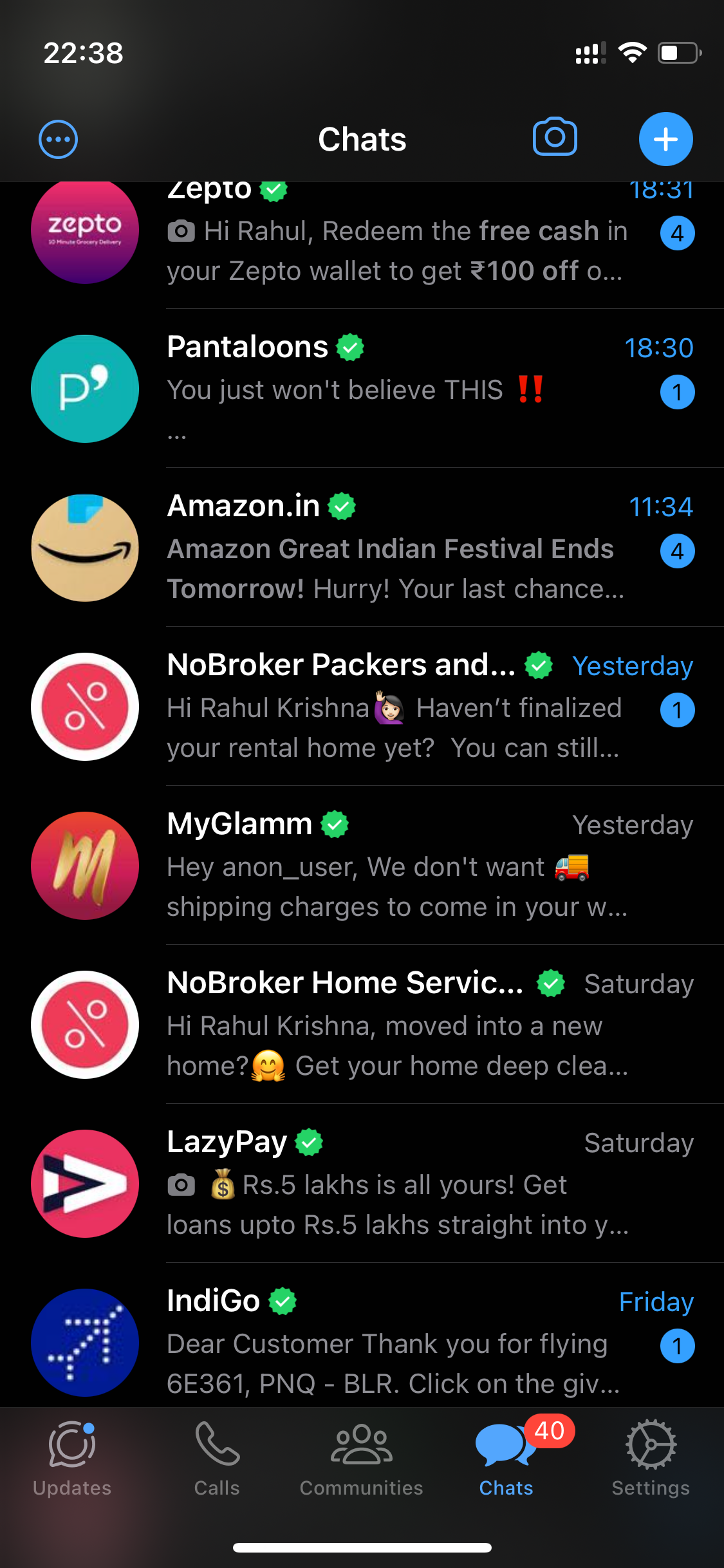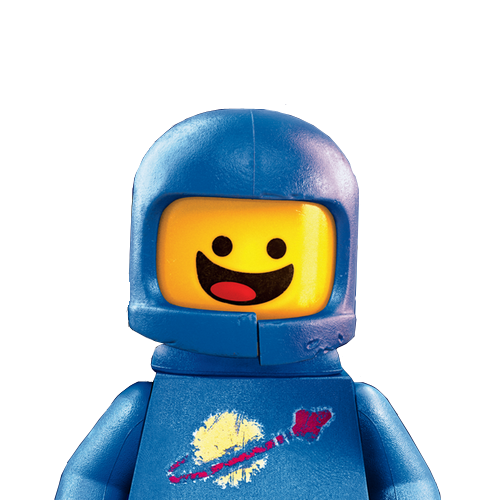Every single person I know or meet uses WhatsApp. About 90% of the businesses I interact with use WhatsApp Businesses. My whole family uses WhatsApp.
Moving to another system is going to take a lot a lot of work.
Say it with me… M O N O P O L Y
deleted by creator
Here in Germany in my circle (which has people from mid-twenties to 60+, from the North to the center), most people use Signal, with Telegram being a rare outlier. WhatsApp is what everyone uses, though.
Here in Australia Signal tends to be used by the left leaning (because of Snowden’s endorsement) and Telegram by the right leaning (they hate Snowden).
Also there are a lot of large chat groups on Telegram - not so many groups on Signal from what I noticed.
I don’t understand why people would share their phone number with strangers like that.
I’m Australian but living in the USA now, and practically everyone I chat to uses Facebook Messenger after switching from MSN Messenger when it shut down. I’ve got Signal and Telegram installed but barely anyone I know uses them.
Telegram has some nice features and I can understand that people want to go away from WhatsApp, but as you said it doesn’t even have end to end encryption and additionally belongs to some Russian. How’s that a beginning?
If you’re already switching, why not go to matrix or signal instead if they are, as you said yourself, most likely the better choice? If you’re switching because of the features, okay. But switching, because of privacy concerns or the company behind it makes absolutely no sense imo.
For as long as Telegram has existed (a little over 10 years now), there has been a concerted effort to discredit it. Because of a game I played 10 years ago, I was on Telegram from its first month. A quick walk through that history:
- The guy who started Telegram was born in Russia, but he hasn’t lived there in almost a decade.
- He made his initial fortune making Russia’s Facebook. The Russian Government wanted backdoors into VK, and details on users. He refused to comply and was basically pushed out.
- He went to UAE, where he has lived ever since. It is here that he focussed on Telegram.
- Again, he refused to hand user details to the Russian Government, and the disinformation campaign began. The Russian Government has tried to block Telegram but has not been successful.
- There have been several posts over the years criticising Telegram, saying that it isn’t Open Source and that its encryption algorithm is prone to vulnerabilities, yet nobody has ever succeeded in breaking its encryption.
- Telegram is now more popular than Facebook Messenger.
As to the criticisms around End-to-End encryption:
- Chats don’t have E2E by default, but you can turn it on.
- Telegram is the most feature rich messenger app - bar none. It is very easy to use, and I have a family chat going with over 1,000 photos in it and no hint of it costing money.
- Telegram still tells governments to pound sand. They step in on the really bad stuff, but for channels that are bad/spammers, but for the most part, they leave the users be.
I’d be quick to leave if Telegram gave me reason to, but it doesn’t. Its status as not-quite a big player keeps them innovating, and its founder’s attitudes leave me tentatively trusting that he’s going to do the right thing.
I’ll take back the the “Russian” comment, then. I already mentioned the larger feature set of telegram and it’s totally fine to switch because of that.
I’m also aware of the optionally encrypted chats, but them not being the default, as well as being more cumbersome to use and without a notification preview means that basically no one uses it (at least in my experience).
As I understand it the feature set wasn’t the reason for switching so I’m curious in what areas telegram might be considered the better choice compared to Signal/Matrix or even WhatsApp. As I see it it’s missing e2e encryption and isn’t as wide spread as WhatsApp.
Telegram has also some big issues with misinformation and conspiracy stuff due to its “hidden communities” and social media aspect with broadcasting and gigantic groups. I personally know people that have been sucked into this and it makes me quite sad.
So I’d be working hard to convince people to switch (which I’ve actually done already with telegram when it first came out) with no real upside and mostly downsides.
I use all three apps, WhatsApp, Telegram and Signal, because others use them. And yes, none of my chats on telegram is encrypted because I’m mostly only in groups anyways.
What I’ve discovered is that especially groups show a certain inertness. For example, I observed that people from a certain context in one city all use signal but people from the same context in a neighboring city all use telegram. So all my groups from city A are in one messenger and groups from city B are in the other. This is weird, right? And these are really the same circles of people and I share many contacts between all groups. But I think it is just important what they started using and now they create more and more subsequent groups in the same messenger. None of them gives a reason to really switch to the other, so they don’t.
Oh, and WhatsApp is only for the few people in my life that are quite unpolitical and uninformed, i.e. ‘ordinary people’. Like people I meet at a language course or something work related etc.
Well, when telegram alucnhed whatsapp did not have e2e encryption so it was more secure than WhatsApp. Then whatsapp implemented it while telegram pushed tons of new features. It’s been some time.
Chats don’t have E2E by default, but you can turn it on.
This is only for 1:1 chats. Telegram doesn’t offer E2EE for group chats at all.
Telegram is now more popular than Facebook Messenger.
Do you have data to back that up? From what I can see, Telegram has 700 million monthly active users (from https://telegram.org/faq) whereas Messenger easily has over a billion. It hit 1.3 billion in 2017 (https://www.adweek.com/performance-marketing/1-3-billion-facebook-messenger/) and the number of Facebook users has been going up since then. As far as I know, they don’t break out Messenger vs Facebook users in their data, but the number of Facebook users is shown in the slides for the earnings reports: https://investor.fb.com/investor-events/
SimpleX uses Signal’s protocol but requires no phone number or sign up.
In business there isn’t a monopoly just yet teams and slack are way more common
Correct. It’s specifically prohibited on my company’s devices.
We are required to use the company provided Teams for instant messaging.
It’s still a little buggy, and I’m all for free and open source, but the whole ecosystem is invaluable for herding cats and dealing with people that forget the passwords they should be using every day.
So, if WhatsApp eventually fails, can we accept for at least just this once, to move on to something that is not proprietary and owned by a large company, please? Please, for the love of everything can we please for once move on to something that is open source and for just this once not repeat the same fucking mistake over and over again?
Nope. Ease to use will always triumph over open source
We’ve got all these devs volunteering time to these FOSS projects but rarely do we have people whose role is to figure out what users want. Devs tend to design from the perspective of “what features do “I” care about” which isn’t always aligned with what users care about.
What’s not easy about Signal, though? :c
Signal needs automatic cloud backups so badly. They’re encrypted anyways, why not allow it as an option?
I’ve used it for years now and it’s great and I managed to get all my friends to install it. But manual backups are basically impossible for the average user. Also it’d be nice if we could bulk export pictures more easily.
You know what’s funny, Snapchat is and always was a confusing mess of a service. Didn’t stop it.
It’s not ease of use that closed-source brings, it’s a brand image. Companies like Apple, MS, Amazon, spend millions annually on shaping their brand. That image makes people feel at ease. It provides context, trust and a sense of familiarity and security because “why would Apple ever spy on me, they are a publicly traded company used by billions?” is more favourable than “oh some geeks made this thing in their basement and can watch me??”
FWIW, I don’t think the last sentence is quite right. I think it’s more like, “oh, some geeks made this thing in their basement? ok, but I have this already made by a rich company.”
Privacy isn’t on the radar, ease of use, design, and how it makes you look to other people are.
I dont think so, Apple Google Meta and Microsoft have to grow their revenue so they will have to make their service either more expensive or crappier. And I think, at some point, this will drive people to open source alternatives. Or atleast I hope so
I want to add “federated” to your list, as the only thing that actually matters long term. Signal checks your requirements but has already started to turn user-hostile (e.g. it mandates its own client so you get to have crypto payments whether you like it or not), and, as the single point of control, is an easy target and a single major liability.
Remember the days when WhatsApp was nice to its users? There is no technical guarantee that other centralized systems won’t go the same path, which is largely mitigated when the network is made of smaller interoperable actors (i.e. a federation).
I would love to see XMPP be rediscovered and massively adopted as that next gen messenger. I don’t trust Matrix to ever be reliable or get past their neverending funding troubles.
Why do people still have faith in this broken system? Companies the size and reach of Meta, do not “fail”. Big companies like these have enough control and power to quash or simply buyout future competitors that would usurp them.
There is no system where people vote with their wallets and we can shift control by way of consumer revenue alone. That dream died some 100+ years ago when companies grew large enough to overthrow governments (Chiquita Banana), shape societies (Walmart & McDonald’s) and build monopolies so resilient, they will control us into the next millennium (Google).
If you’re all banking on the freedom of economy and capitalism self correcting, man is that a long wait for a train that won’t come.
There are many people on the privacy communities that will preach about Telegram. Those are supposedly “privacy conscious” folk. Bro, most people just need a slick looking interface that makes them feel cool. Hating on Meta is also somewhat cool at the moment, and those two reasons are why most people switch.
There is no hope.
Telegram doesn’t even support encryption for group chats!
Isn’t Whatsapp owned by meta?
If so, why do people use it?
Find the change. Be the change.
why do people use it?
because it gained popularity in countries where sending SMS used to cost money at the time, years before Facebook has purchased it, became the main means of communication, and it turns out that moving an entire country’s (or even continent’s) population away from a messaging app has proven to be difficult.
Also because MMS was/is dogshit and sending photos etc through WhatsApp was much better
Ironically, it got popular when it still tried to get users to subscribe to a monthly payment. And as it was one of the few messaging platforms to be (in the future) paid at all, I cannot understand why it ever got popular…
Well, sure, Meta cancelled the subscription plans later but to me it sounded a red flag in the first place.
Whatsapp became popular because it was the only app that ran on everything in 2010, it ran on the newly appeared smartphones as well as on featurephones. Nokia, Blackberry, Android, iPhone, Windows Phone, you name it, it was supported.
Okay, that is a very good point that I did not realize.
And as it was one of the few messaging platforms to be (in the future) paid at all, I cannot understand why it ever got popular…
Because that way people thought they were directly paying for the service they were using, instead of being the product of said platform, having their personal data harvested and sold to the highest bidder?
Well, sure, Meta cancelled the subscription plans later but to me it sounded a red flag in the first place.
The red flag is to look at a free meal and not wonder what the catch might be. Especially to this day, with all we learned about what the tech majors do with all the data.
Because that way people thought they were directly paying for the service they were using, instead of being the product of said platform, having their personal data harvested and sold to the highest bidder?
Are you saying that people perceived WhatsApp as better than SMS or better than Facebook?
The red flag is to look at a free meal and not wonder what the catch might be. Especially to this day, with all we learned about what the tech majors do with all the data.
That’s not my point. My point is why would the majority of the world do this when they knew it was going to be paid.
I can’t think of other product examples where people would so gladly accept trial versions of otherwise free feature-equivalent services. Maybe WinRAR, but that could be replaced with any other product instantly anyway (no network effect), should it ever get enforce its trial.
Because that way people thought they were directly paying for the service they were using, instead of being the product of said platform, having their personal data harvested and sold to the highest bidder?
Are you saying that people perceived WhatsApp as better than SMS or better than Facebook?
As it happened, both.
The red flag is to look at a free meal and not wonder what the catch might be. Especially to this day, with all we learned about what the tech majors do with all the data.
That’s not my point. My point is why would the majority of the world do this when they knew it was going to be paid.
Back then, the norm was to pay for a service. When it’s good and the price is fair, people use it, especially when the alternative was feature-limited SMS paid by the message at inadequately high cost. And Facebook isn’t free: you trade privacy and exposure to customized ads in exchange for access to the service, so your comparison is biased.
Whatsapp was a paid service in some areas, but only $1 per year.
Yep. It’s like that here and it sucks ass. Every person and business uses it. I think even the Gemente does in some cases.
Pretty much, I use Telegram always I can (I know it is not Signal, but there are tons of custom ROMs groups and channels and I use it to chat with closest friends), and oh boy it is just better than WhatsApp in any aspect since… Since I don’t remember when I started to use it… It just got updated with an enhanced reply system (quotes) and it is awesome.
Meanwhile family, companies and pretty much everyone else is at WhatsApp… I mean it could be worse, it could be Messenger LMAO.
I was shocked when I read around here in Lemmy that people chat with SMS on Android those haven’t been used here since 2012 at least!
moving an entire country’s (or even continent’s) population away from a messaging app has proven to be difficult.
It’s not that difficult. During the pandemic there was a privacy scare when Whatsapp was rumored to plan on breaking encryption. There was an upsurge in Signal installations and I actually got a small group to use it for a few weeks before the scare died down and we returned to Whatsapp.
If Meta really thinks people won’t switch it may have an unpleasant surprise.
Be the difference!
People are stupid and don’t care. I doubt many people here on lemmy are using them but there is always gonna be some using those mentioned, Instagram, or any of facebooks ‘services’.
No. WhatsApp was well established before Facebook got involved.
This is snobbish and elitist. The evidence of this thread alone is that people who interact with this instance or use Lemmy generally also use Whatsapp. For many, it is convenient, relatively secure and private, and free. It engrained itself as the default communications platform in many countries, and Meta ownership doesn’t have any tangible impact on its use for anybody, so far as I can tell. The “people are stupid” line is just ignorant bollocks.
Sorry if it came off like that.
But if Facebook came up and bought my messaging service I would be looking for an alternative as soon as I could instead of just going “oh I used this before and don’t want to change”. Obviously if WhatsApp is your only option then use it but keep it as minimal as possible. Or just don’t give a fuck like 90% of people 🤷♂️
I’ve brought up other services with some of my active groupchats, but nobody else cares or wants to switch. Soooo I’m stuck in Messenger+Whatsapp, Discord, Groupme (Microsoft), and Slack (Salesforce). At least I got out of Snapchat?
I despise anything Facebook, Meta. Zuck. But with shitty internet, WhatsApp is the only thing that works. If they put ads, I am gone from it.
WhatsApp is based on XMPP, hence why it works so well, but with the difference that nobody “owns” XMPP (it’s a network of account providers, just like email where you can be a @outlook.com and exchange messages with @yahoo.com).
You can start there and see how well it works for you and whether you want to embark your contacts with you. For me the main motivator is that XMPP, as a decentralized and extensible protocol, will still be there long after I’m dead. I’m done telling people around me to install this or that App, all I want is the confidence that whatever I’m using is the last messaging system I will ever need (won’t go bankrupt, won’t turn against me, will remain secure, will have all the desired features …), and that’s the only one that qualifies.
In Belgium they even use Facebook Messenger as the default messaging app… There is little hope in people
It makes it hard to even want good for the world. 😑
As someone in the Netherlands who has to use it and really doesn’t want to, I sure hope this motivates to Dutch to stop using this stupid app as the defacto texting platform.
That’s why I’ll defend vigorously the way we use SMS in the US.
Sure, it’s an outdated, insecure, bad system. Improvements like RCS are still iffy and poorly-rolled-out. But it’s also a standard you can use to connect with EVERYONE, isn’t controlled by a single private company (even if the evil fucks at Google desperately want it to be), and is totally interoperable between apps (since the apps are, after all, merely implementing a protocol).
I have high hopes the interoperability standards the EU is proposing will amount to something, but I won’t be holding my breath for it. In the meantime, I am not going to switch to whatever app is trending until it can at LEAST do everything I currently can with SMS.
WhatsApp claims to be E2E/not readable by Facebook and to my knowledge, all we have to the contrary is speculation provided you verify the keys on both ends (same as Signal). Facebook might know who you’re messaging but that’s also true for Signal. I’d still 100% trust Signal over WhatsApp given Facebook’s massive conflict of interest, but SMS has been known-bad and collected by the NSA for a decade now. US telecommunications companies also have a terrible reputation for privacy. The only advantage it has over any other platform is portability between providers but even that falls to the side since you can have multiple messaging apps at once.
Facebook might know who you’re messaging but that’s also true for Signal.
Signal’s sealed sender does a good job at knowing you’re sending a message, but not who to. All it’ll know on the receiving end is that a message was sent to it.
Of course people have found other methods of identifying this but sealed sender does cover most of the low hanging fruit.
Signal does also purposefully attempt to find ways to not collect any metadata, whilst also making it more difficult for anyone attacking to the servers to find anything. (e.g. ORAM for Secure Enclave operations)
My understanding is that meta used E2EE on your messages themselves, but everything else is up for grabs.
Don’t buy into this, this is just marketing. I’m not saying that Signal is acting in bad faith, only that they chose to design a communication silo with themselves at the helm instead of a federation of servers/providers united by the same protocol. Because of that, they own all accounts, and have the monopoly of messages being routing on the network. Of course there is no difficulty for them knowing who’s addressing whom, how often, with what kind of payload, by topology. “Sealed senders” and “secure enclave contacts discovery” is just techno babble meaning “trust us, bro. Especially because you have no choice, anyway”.
I’ll trust what the cyber security and privacy experts say.
Is your source for “what privacy experts say” a sad jpeg meme, really?
Also, no matter what some distracted expert might say, the only fact that matters is that none of Signal’s marketing claims are verifiable: the feature you are referring to happens server-side. Nobody but Signal knows what runs server-side. The guarantee of “not knowing who’s talking to whom” isn’t built into the protocol itself. This is where trust enters the picture.The dominant paradigm in cybersecurity is that trust is not proof of anything. Math is. And “sealed senders” isn’t that.
Facebook lies all the time. Why would anyone believe anything they say?
Fair. But I would say they have a disincentive to lie about E2E because it’s a selling point of WhatsApp and if they didn’t care they could just roll WhatsApp into Facebook Messenger where there is no promise of E2E.
If E2EE was broken in any app (not just WhatsApp but also Telegram, Signal, iMessage, etc) then someone would have figured that out by now by sniffing the traffic and analyzing the apps in a debugger.
They won’t. Most people just don’t care at all unfortunately :(
“Privacy conscious WhatsApp users” 😂 My sides.
WhatsApp could flip on ads right now, right in the middle of messages and the majority wouldn’t switch.
They put ads in I’m switching. People can send me SMS for all I care
There’d be at least some Whatsapp users that chose to use it because it’s end-to-end encrypted using Signal Protocol
If you record the screen of somebody typing, it doesn’t matter if what they’re sending is E2EE.
If any popular messaging apps were recording the screen, it would have been discovered by now. Plenty of people are reverse engineering popular apps all the time.
That came out wrong. It’s just a way to say that E2EE doesn’t matter if you’re in an environment or app that has control over everything until the actual message is encrypted and sent. Closed source apps are to be trusted much less than opensource apps in this regard.
Please do it! That would help me convince my reminding friends to move to Signal.
But how is Signal going to make enough money to support a massive user base?
Also, the article says
Cathcart responded that WhatApp will not have ads within the inbox or in the “messaging experience.”
So it seems they’re just going to be added to the extra features that most people don’t care about. Of course they could always change their mind, but that seems like a suicide move.
My exact thought.
And perhaps this will force the eyes open of many companies that use that garbage to circulate private and delicate communications.
For the people who suggest users just change apps. Imagine I just ban all your current forms of text communication (you can still have e-mail), but only you, your family and friends will keep their ecosystems. Do you care you won’t talk to them anymore? Can you convince them to use a new app? Does it affect your life beyond social interactions? Is it worth making your life harder?
Signal has a feature that tells you when done of your contacts starts using it. So I know for a fact how many of my friends have the app and let me tell you, it’s a lot more than I thought. At least 50-60%, which means it wouldn’t be that hard to tip the balance if Whatsapp pulls something truly stupid.
I can’t speak for everybody obviously but from what I’ve noticed people around here aren’t overly attached to any particular messaging app. One app, two apps, three apps, it doesn’t really matter, you use what you need. There’s nothing stopping you from keeping Whatsapp around for the chat history but doing your future chatting on Signal, or mixing the two. It doesn’t have to be all or nothing and it doesn’t have to be a hard switch all at once.
There’s no reason to trust Signal more than WhatsApp long term: the flaw isn’t whether it’s opensource or not, or whether it operates as a nonprofit today or not. The core issue is centralization: as soon as you accept that a single organization owns the whole network, you lose all leverage and freedom, and you should only expect that it will eventually turn against your interests with no recourse. Favour federated protocols (e.g. XMPP) which are by design largely immune to this, if you search for a stable and safe place for the long run.
I will let Moxie answer that: https://signal.org/blog/the-ecosystem-is-moving/
His opinion is that federated systems are too stable, to the point of paralysis by [lack of] consensus. If you want to be able to advance the state of technology he feels that centralized systems are the way to go.
Moxie is the megalomaniac behind Signal, of course you would expect him to back it up, but cherry picking facts doesn’t make a good nor convincing argument. Here’s a rebuttal by an XMPP developer. The current state of XMPP practically proves Moxies’ post to be FUD: XMPP has multiple compatible, secure and maintained clients and server implementations, and by its decentralized nature, is more preserving of its users’ metadata, and more resilient than today’s Signal.
I know that diversification has its advantages. I’m a firm believer in it, and I think it’s one of the main reasons to which Linux for example owes its resilience and flexibility. But decentralization also means it takes a long time, sometimes a very long time, for the that particular product’s benefits to become known and widespread. Linux is a general purpose product which was able to find multiple niches in which to thrive. But other products have a much more narrow scope, and sometimes if they miss their window of opportunity they’re relegated to the subnotes of history forever.
I believe that’s what happened to XMPP, IRC and so on. At some point there was an opportunity to move with the times and add popular features and become user-friendly but they didn’t, and commercial products that could offer those thrived instead. We as geeks would often like to think it’s all because of the marketing power of wealthy companies, but we scoff at the notion of “user friendly”. Let’s look at Telegram and how well it’s doing in spite of having neither the marketing power of Meta or Apple, nor the technical advantages of XMPP or Signal.
This is a danger that applies to Mastodon and Lemmy/Kbin too, and which Mozilla is currently trying to address. If the Lemmy community doesn’t put some effort soon into addressing its outstanding issues that prevent easy adoption by new users, it will eventually fade into obscurity and become just as obscure as XMPP.
I realized that my previous post didn’t embed the rebuttal link I was meaning to send, so please give it a look, sorry for that.
But decentralization also means it takes a long time, sometimes a very long time, for the that particular product’s benefits to become known and widespread.
This is true: one can’t possibly come up with a new chat product within few months would they want it to be an internet standard (which XMPP is) and having diverse parties implementing its components (which XMPP has). My question to that is, do we really need new chat products every other month? I personally consider that instant messaging was a solved problem 25 years ago when AIM/MSN & al. were ubiquitous and used by everyone and their aunt. Arguably, current generation’s messengers pack less features, not more, than those they precede, and that’s a trend we also observe within XMPP: old specs defining how to game together, share tunes, share whiteboards, … are slowly fading into obsolescence.
Nowadays XMPP has all the relevant features one would expect, in spec and implementation. There was a time when XMPP had problems with mobile use, not because it wasn’t adequate (it was successfully used over extremely low bandwidth before), but because Google and Apple had decided that they would silently kill clients and a new protocol had to be figured-out for that event. That’s perhaps a “once in a decade” evolution, which happened at a time the XMPP ecosystem wasn’t as vibrant as it is today.
I believe that’s what happened to XMPP, IRC and so on.
IMO what happened has nothing to do with “features” nor “moving with the times”, what happened was a lot of venture capital money to answer every tech giant building their own walled-garden messaging platform. Again, all current “modern” messengers can do pretty much the same thing, look the same, and came-up roughly at the same time (and yes, this applies to Telegram, too).
This is a danger that applies to Mastodon and Lemmy/Kbin too […] become obscure
This is not a danger, this is inevitable. Don’t expect Lemmy/Mastodon (and the Fediverse in general) to become mainstream this generation: the internet doesn’t work on merit, people don’t spontaneously lean towards what’s “best”, even for themselves. Only tech enthusiasts do, and as it happens, they have a negligible political and societal impact compared to the (tech) majors. IMO no amount of persuasion by the geeks will change that. What I believe matters is, on one side, to define and standardize future-proof protocols and have them audited for security (XMPP is uniquely positioned here), and on the other, to lobby politicians so they make use of the existing legal framework (forbidding anti-competitive practices and monopolies, mainly) to level the playing field and compel the majors to become interoperable using said protocols. Mozilla may play a role in that, but what’s going on with the EU and the Digital Markets Act is worthy to keep a close eye on.
Edit: typos and rephrasing
That’s why I’m rooting for RCS.
For cross-protocols messaging? Sure! But it has its flaws (for instance, only message bodies are encrypted, which makes XMPP’s OMEMO a superior solution in 1:1 and small groupchats). Also, it tackles only a small part of the problem, the larger picture (and problem) is about how the different protocols should inter-operate (exchange handshakes, keys, …), and this is nowhere near ready yet: https://datatracker.ietf.org/wg/mimi/about/
Telegram is the same. It’s the app people will migrate to because it’s the app people learned to use when WhatsApp can’t operate for some reason. Not many people there. People here are overly attached.
The day that happens I can hopefully uninstall this thing already. Most of my friends use it, they’re really big here in Europe. Pretty hard to move to another app.
If that doesn’t convince your friends, nothing will.
I use iMessage to text my close friends. But I live in a country where WhatsApp is a verb.
So I do end up using WhatsApp and in my experience, it’s already riddled with

I don’t see how it can be any worse tbh. Instagram ads are way better imo.
Isnt the EU working on something requiring Whatsapp to open up cross messaging for Signal and co.? If they do, there is no reason to be on wa anymore.
Yes the DMA. WhatsApp has the skeleton code for it in place I think
No I think they’re pushing for RCS, that SMS successor thing that’s supposed to be a standard on Android phones (which it is, only caveat for now is you can only use the Samsung and Google Messages app), but Apple is the only one not using it. I believe they did manage to force Apple to get working on ditching iMessage for RCS by mid-2024.
The thing is… I still wouldn’t want to send private messages to a WhatsApp user, because that would mean those messages are also handled by a service I specifically meant to avoid by switching to Signal.
But then again, Signal spoke out against it anyway, precisely for that reason.
Yeah maybe, but it’s important to cross message otherwise you loose against the scale effect of Whatsapps userbase
Smaller services like Signal wouldn’t be forced to do it though, since they don’t pass the threshold to be considered a gatekeeper.
So we’ll have a situation where WhatsApp is forced to open up, but barely any of the private services will actually make use of it.
I can also see WhatsApp users being even less motivated to switch to better alternatives if everything was interoperable, so we go right back to its huge userbase being a problem anyway.
Idk, I honestly don’t see this law changing much in the messaging space. Though I will never disagree with consumers having more options.
I’d like to use signal as my daily messaging App. But all my friends are on wa. If I can cross message them from signal, I will stay on signal. One less user for whatsapp.
We’ll see how it plays out. Have the lawmakers even thought about if and how services have to inform users between one another about their respective TOS?
Like, I wouldn’t want to connect to another service before being presented with their terms and privacy policy. Only then should I be able to make a (now informed) decision on whether I want to do it or not.
I guess it all boils down to why you use a certain service. I use Signal to avoid having my messages handled by a service that belongs to Meta. Texting with a WhatsApp user would defeat the whole point for me.
Yeah but it’s not about you, it’s about making the messaging app choice in the daily life more balanced for the average user. The average user doesnt care about tos or privacy. You wont get the average user to switch to signal by saying “take care of your privacy”. The average user wants to send messages to their friends. Thats it. And because publicly traded companies have to grow they have to increase revenue from their services. So, monetize user data, which lawmakers could stop, increase revenue by charging a fee, which the average user doesnt want to, or show ads, no one wants to. And I guess free software has the benefit of working without the need to monetize their users. THIS is the selling point. And if you get it to work across different messaging apps, users will leave wa.
YES PLEASE BRING ADS. It will be one more reason to convince people to get off the platform.
🤖 I’m a bot that provides automatic summaries for articles:
Click here to see the summary
WhatsApp might still deploy ads on the platform alongside the app’s Instagram Stories-like Status feature, company head Will Cathcart recently said in an interview.
As pointed out by TechCrunch, Cathcart stated that WhatsApp ads could show up in different places within the app, including the newer Channels feature and statuses, though no timeline was provided for the change.
In the Brazilian publication Folha De S.Paulo, the interviewer asked Cathcart if WhatsApp would continue to be free and without ads.
Cathcart responded that WhatApp will not have ads within the inbox or in the “messaging experience.” Cathcart also added that Channels could charge people to subscribe, and the owners could promote ads for it within Channels.
The Meta-owned messaging app has looked for ways to plaster ads in the app starting as early as 2018, when the company (then known as Facebook) looked to put ads in the Status feature.
However, in 2020, it seemed there was some internal fear about flipping the switch on ads and how privacy-focused users would react, so the delay continued, but plans for ads in the feature remained on the docket.
Saved 0% of original text.
Good bot
saved 0% text
It’s trying its best ok
One more program to delete.
boooooo
Ugh and I just got my dad to use it instead of SMS
(No he will not use Signal)
Can I ask why he wouldn’t use Signal?
Delete your WhatsApp, block your SMS and if he wants to talk with you, he will use Signal.
Maybe he will switch even quicker if you punch him or pull his teeth out.
Well, not sure, honestly, might also stop him from speaking with you. Regardless of the outcome I don’t really recommend violence, but you do you 🤷
Not the method of a narcissist or manipulator at all, that.
Nope, just a method of someone who values his privacy. I’ve done this and I’m quite happy with the result. Sure, I’ve lost a person or two, but that’s an acceptable price for not giving Meta data it does not need.
deleted by creator

























